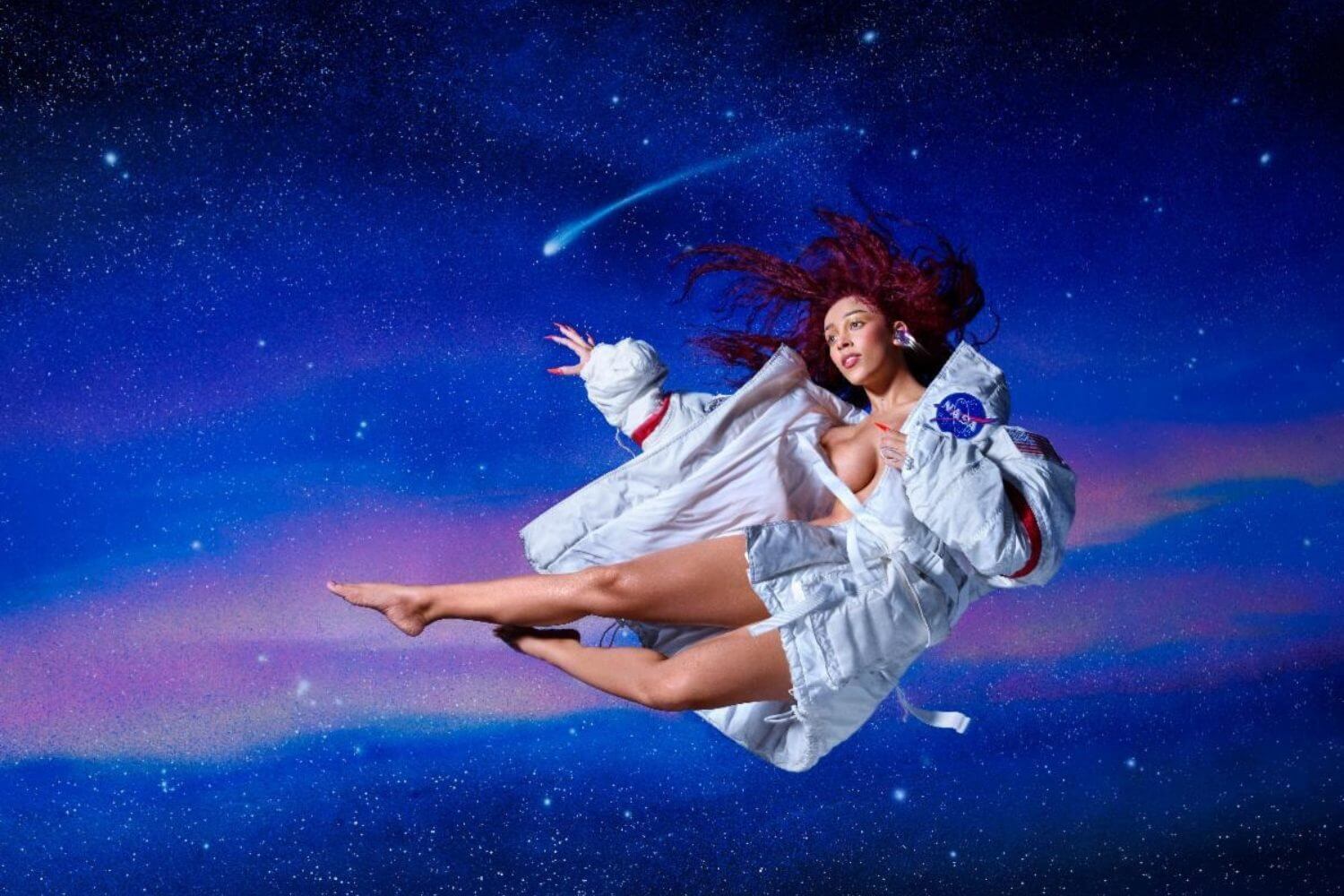Just 3 years ago Amala Dlamini, famously known as Doja Cat could have been described as a humorous and talented niche musician. In some ways Doja Cat is an unlikely music star, however considering all her talents, ‘marketability’ and how well she mixes her various genre influences, it’s surprising she wasn’t famous sooner. On June 25, 2021 the “Streets” musician released her 3rd album Planet Her, a follow up to the commercial success of her second LP Hot Pink. With Planet Her, Doja Cat proves her previous successes weren’t flukes and that she isn’t simply riding the current wave of female rap popularity.
On Planet Her, Doja Cat solidifies her musical signature, as a distinct sound that reaches the masses. Her 3rd album sonically catapults her into a category of her own, she plays masterfully in spaces few other mainstream rappers have been able to skillfully occupy. Let’s take a moment to understand the significance of Planet Her to hip hop and beyond, and why it may be one of the best commercial albums of 2021.
For some artists, their involvement in the creation of music often begins at one level, vocal performance (with varying degrees of skill). Yes, Doja’s glossy pop star ready image could have some mistake her for a pop music figurehead, detached from the roots of music making. However, Doja’s background in instrumental production gives her an added skillset which sets her apart from many of her contemporaries. In addition to her knowledge of production, Doja Cat doesn’t shy away from blending genres, and she does it quite well.
The music industry and hip hop specifically, has not always had a great relationship with genre blending women. Only in more recent times have more female rappers been able to find mainstream success by mixing genres. The sorting of music into distinct categories has served as a categorization tool, but also as a barrier for Black artists especially. Essentially, Pop music is deemed white music, while hip hop and r&b is Black music. This rule has been applied on a race basis first, regardless of the actual music genre an artist produces. The exceptions to this happen only when there’s a blatant push to market said Black artist to ‘whiter’ audiences (Doja Cat for example), or if the Black musician’s genre is too divergent from hip hop and r&b, like rock music for example. With Planet Her, despite its consistent hip hop elements, the album is currently classified on many platforms as Pop.
In the past, genre blending hip hop artists were mostly appreciated on the outer edges of mainstream commercial success. 15 to 20 years ago Doja Cat could have been seen as hard to market. Is she a singer or a rapper? Is she pop or hip hop?. Today, thanks to artists like Lauryn Hill, Andre 3000, Drake and Nicki Minaj, artists like Doja Cat have a much easier time navigating the music business as genre blending, hip hop musicians. Currently, hip hop is more focused on mood setting vs genre purity and exclusivity.
Planet Her is quite frankly the most cohesive amalgamation of popular genres I’ve heard in the past decade. While Doja Cat’s consistent ingredient is hip hop, she stirs in punk, pop, r&b, and pop-rock vocals with beautiful synchronicity, all while spitting lightning fast raps. And for those who are partial to clever wordplay, her rap lyrics are decorated with witty, bold metaphors that may require a second or third listen to understand –– “you just wanna pop up on these clowns, you the batman.”
Doja’s singing voice is light and clean, ethereal sounding. The quality of her soprano is reminiscent of many of the sounds of the late 90’s and very early 2000’s pop-rock/pop-folk records, “Kiss Me” by Sixpence None the Richer as an example.
Her influences are quite audible, however she doesnt run away or lose herself in them.
Influences accounted for, she still delivers a distinct Doja Cat sound. Perhaps this is most noticeable on her song “Get Into It (yuh).” On the record Doja raps in a very recognizable pattern made popular by rap queen Nicki Minaj. She raps with a similar playful aggression that escalates, then ends with a loud inhale (see Bottoms Up ft. Nicki Minaj). Another noticeable rap influence is perhaps her Kendrick Lamar influence. I would argue Kendrick Lamar is probably her most audible, though less obvious hip hop influence. Currently, Doja Cat is the most versatile rapper to impact mainstream female rap in the last decade.
The comparisons to Nicki Minaj are inescapable for any female rapper, and while this comparison may cast a shadow on other rappers, for Doja, she actually shines in the face of the comparison. I’d say, where Nicki Minaj is more Jay Z/ Foxy Brown (hip hop), with Britney Spears/ Cyndi Lauper (pop), Doja Cat is more Nicki Minaj/Kendrick Lamar (hip hop) with Little Dragon/ Avril Lavigne (pop).
What sets Doja apart is how well she synthesizes distinct sounds into genre balance. Planet Her is most definitely a let it play, skip no tracks album. However, I do have some current favorites. On the album opener “Woman,” we hear Doja Cat effortlessly flex her musicality and give us an afrobeat record. On “Been Like This,” her soft soprano floats above ambient sounds and percussion, as she sings about a change in the behavior of a lover. And lastly, “Get Into It (Yuh)” showcases Doja at her most punky and playful.
Doja Cat is a fulfillment of decades long influence and work of rap predecessors who helped create more space for dynamic talent to be commercially viable and mainstream. Planet Her is everything we loved and appreciated about mainstream hip hop, pop-rock, pop-r&b and indie-pop over the last 15 years. Enjoy Planet Her now available on streaming platforms.










